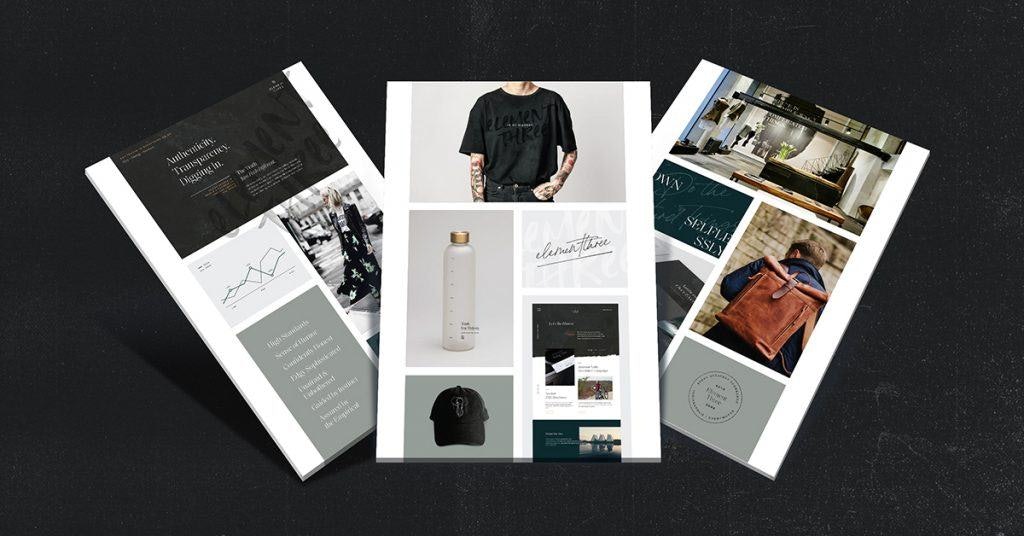Is your brand vegetarian? Or are they a ten-time champion of the hot dog eating contest at your local state fair?
Picture yourself at the store, in front of the hot dog aisle. To your right are good ol’ classic Hebrew National hot dogs, and to your left, a collection of plant-based franks almost twice the cost. Someone walks up and swiftly grabs two packs of Hebrew National, not even thinking twice. A minute later, someone comes up and reaches for a plant-based packet, placing it in their cart. Now, answer: What did the first person look like? What shoes were they wearing? How did they accessorize? Now, answer those same questions for the second person. Polar opposites, maybe? How can different lifestyles portray themselves differently on the outside? Which one are you more likely to hire, based on this one interaction?
As much as we don’t want to, we are always making assumptions, and your audience is making an assumption about your brand at this very second. When they look at your brand, who are they seeing? The new-balance-wearing dad stocking up for next weekend’s grill? Or the foster-kitten-parent graduate student needing a quick fix for her shortened lunch breaks? Your audience will choose whichever they resonate with the most – and if there’s nothing to resonate with, what would make them choose your brand compared to your competitors? This idea is called Brand Personality: The aspects of your brand that connect to the human experience, improving the connection between your audience and your brand.
So, what is Brand Personality?
Brand Personality can be described as the persona of your brand. It offers the results of personification without needing a literal mascot or human representation. Brand personality is the practice of instilling human qualities within your brand, and then becomes the backbone of your brand’s tone and voice, alongside your values and story.
Imagine if you were to have a conversation with your brand. They wouldn’t respond in services, CTAs, or headlines. If they did, that would be a lousy conversation. They would respond in language, a particular banter that could only belong to them. Would you be able to tell your clients how your brand would speak to them? If you have to answer for your brand, your brand personality isn’t strong enough yet. A brand with a strong personality will speak for itself, and that kind of engagement will bring customers to respond.
Why is Brand Personality Important?
Brand personality strikes a chord in human nature – the desire for similarity.
Humanity has continually survived off the idea of having a family or tribe – a collection of people who are like themselves. From politics to sports teams, each person has a desire to connect with someone who is similar to them. Brand personality gives your service or product the opportunity to create a connection that mirrors what we, as people, are already looking for: relatability, connection, and mutual agreement. Brand personality provides more opportunities for your clients to relate and connect with your brand.
What makes a good Brand Personality?
First and foremost, a good brand personality corresponds to the product or service it offers. In the same way that form follows function, personality follows product (or service). You wouldn’t want a slapstick personality for a luxury product, as that would diminish your brand’s credibility. The brand personality must be honest to the product, otherwise, clients will not trust your services.
Some examples of good brand personalities are:
Nike
Nike is one of the top athletic brands, and its personality rings true to its products. Though an athletic brand, its personality leans more towards one of a luxury product. They are modern, clean, inclusive, and push the boundaries in all the right ways. Their personality allows for freedom in campaigns, especially with their documentary-style way of storytelling, which matches the refinement in their brand personality. Nike, easily, could be a colorful, upbeat, fast-paced personality, but their luxurious and minimalistic approach makes them feel at the top of the market. They reach a broader audience and build credibility right away with their sleek presence.
Harley Davidson
If you’ve never driven a motorcycle before – what other motorcycle brands can you name? Harley Davidson’s iconic legacy has stood the test of time. This rebellious brand matches the feeling of owning and riding a motorcycle, so much so that even bystanders wear Harley Davidson merchandise. The brand personality in itself is catchy to almost any audience, and the quality of its products leaves its customers loyal for life. Its straightforward, hardy, and honest presence offers a distinct brand personality. When Harley Davidson walks into a bar, they order whiskey, despite their extensive collection at home. They don’t believe in mixers. They honor the simple things in life — valuing first and foremost the journey — that every person can relate to, and resonate with.
No one is without a journey, making everyone suitable for a Harley Davidson. They are not adopting trends, making this brand timeless, honest, and loyal — and their audience returns the favor. Harley Davidson is a great example of a brand understanding both its product and its audience, then giving it a personality that caters to both. This Americana, rebellious, and luxurious brand has captured the attention of almost every consumer, inside and out of their primary audience.
Trader Joe’s
Trader Joe’s brand personality is a perfect example of how to correspond your personality to your target audience. Whoever Trader Joe is, most can picture them as an indie-folk connoisseur with Birkenstocks and a screen-printed, canvas tote bag, which looks similar to many of the customers they attract. Similarity breeds loyalty, and Trader Joe’s has got it right. If you’re unsure of their brand personality, hang out in one of their stores and observe the types of people who shop there — you’ll find the similarities between brand and audience in a matter of minutes.
This quirky grocery store has captured the hearts of its customers. Trader Joe’s brand personality is especially successful because grocery stores, as a necessity, don’t require a strong brand presence. Proximity and price will drive a grocery store’s performance, and brand often takes the backseat. Trader Joe’s took a wonderful opportunity to create a well-established brand for their store, which gave them a charm that outstands the competition. Not only do their customers go to Trader Joe’s for groceries, they also go for the experience. The organic selection, friendly workers, paper bags, and distinct food offerings give Trader Joe’s an upper hand in the grocery industry. The store doesn’t cater to everyone, but because its customers are attracted to its brand presence, they return to Trader Joe’s every time. The limited selection of goods creates an experience, like going to Trader Joe’s is an adventure, rather than an errand. Trader Joe’s quirky, lighthearted, and sustainable-focused personality charms their customers in a way that can’t be resisted, making their audience incredibly loyal.
When given two brand options, the consumer will always choose which one they resonate with, even if the quality is lower than the competition. Consumers like to have a team, a tribe, or a family. They stick to the groups that agree. Once your customers find that your brand aligns with them, they won’t leave until you break their trust – which is why your brand personality must be honest, thorough, and solidified to stand the test of time.
So, how do you know if your brand is vegetarian?
How to find your Brand Personality
Do a Personality Deep Dive
As a team, ideate who would be the ideal representative for your product in thorough detail. Do they drink coffee or tea? Do they have pets? What music do they listen to? What movies do they watch? What kind of residence do they live in? What are their hobbies? What are their values? How do they speak? Would they stand up to you in a fight? Would they bring over homemade cookies to a new next-door neighbor? Would they be the one to hold everyone’s tickets at the airport? Lean into brand core values during this exercise. Ask a lot of questions, especially the absurd ones, and answer every single one.
Create a Mood Board
If you’re struggling to come up with answers in your Personality Deep Dive, create a mood board instead. Visualize your brand personality in design elements. What would your brand wear? What kind of bag do they carry? Where do they work? Where do they travel or aspire to travel? What typeface feels like your brand? What colors feel authentic to your vibe? What images speak to you?

Ask Around
If you haven’t explored how your audience responds to your brand, now is the time to start. Listen to what your customers are saying about your brand–good or bad–and use their feedback to influence how you approach your brand. This will honor your brand perception and keep your brand true to your audience. Remember, honesty is key. Customers gravitate to a brand they can trust.
If you want to discover your brand’s personality but don’t know where to start, that’s what we’re here for. As a marketing consultancy with a knack for powerful creative, there’s nothing we love more than a good, effective brand. We love them so much we’ve written loads of content on how to enhance your brand. Check out some of our blogs and case studies as first steps. If these don’t satisfy your hunger, reach out to us and we’ll see what we can do to help. We’d love to meet your brand.
So, is your brand hosting the annual block party with stacks of meat ready to hit the grill? Or, are they attending with their own boxed lunch with their favorite plant-based weenie? If you don’t know the answer, that’s okay, but now you know where to start.
Get cookin’!





